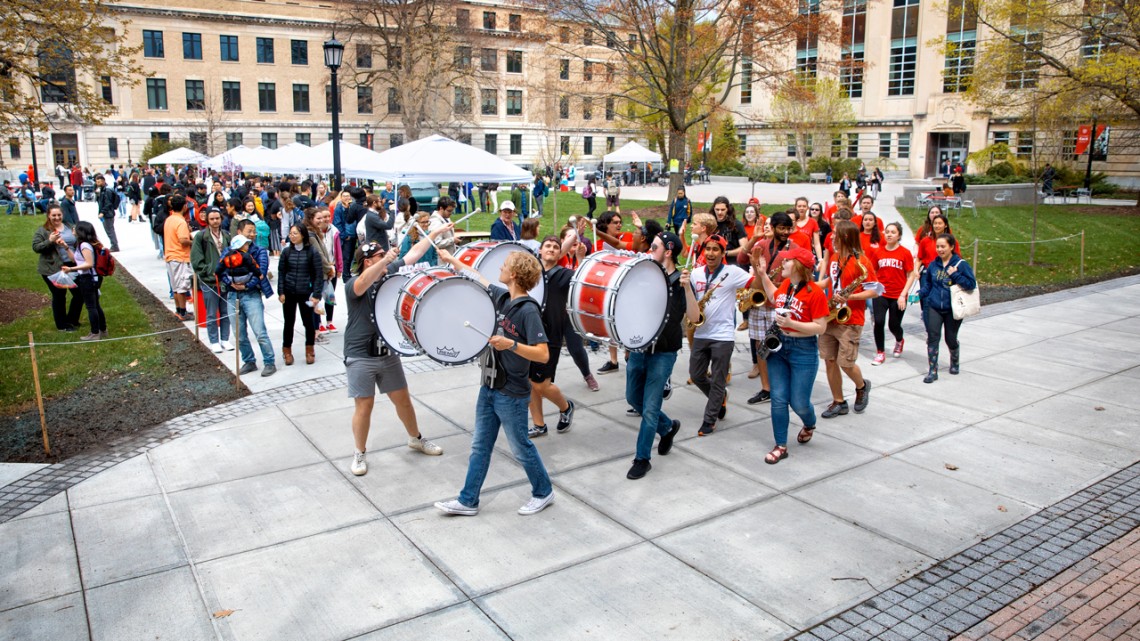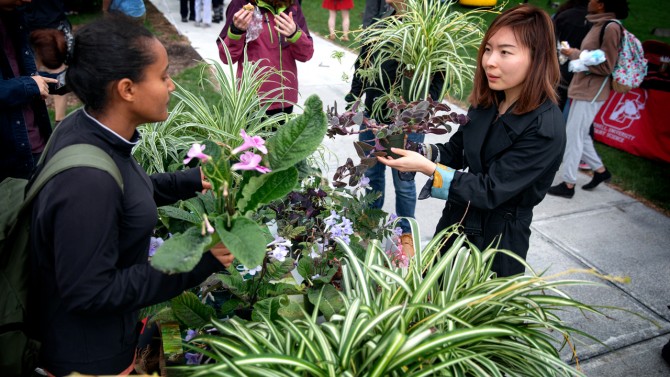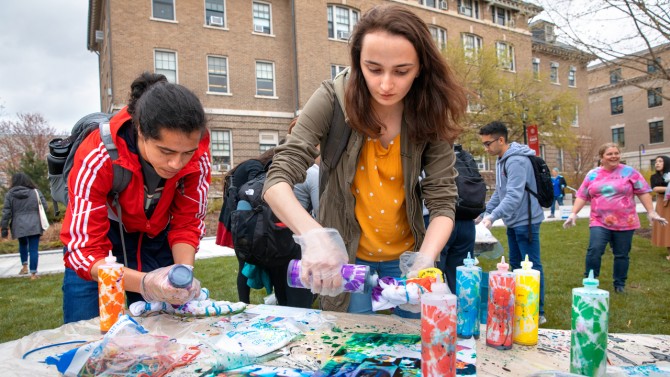
The Cornell marching band performs near Mann Library for CALS Day.
Science, diversity celebrated at CALS Day
By Matt Hayes
From artificial intelligence to Zeus variety hops, there was a bit of everything from the College of Agriculture and Life Sciences (CALS) at its second annual CALS Day, April 26 on the Ag Quad.
CALS Day took on a festival atmosphere with more than 35 science exhibits, food, animals, tie-dye and music during a celebration of the diversity of the college’s research and people.
“This is so great for people who don’t realize the breadth of study available at CALS,” said Aleah Jones ’19, an agricultural sciences major from just outside New York City. “I feel really blessed; you are surrounding yourself with greatness and so many opportunities by being here.”
Long lines for free T-shirts and ice cream formed as the community gathered despite the brisk weather. Within the first half-hour, about 500 shirts and tote bags were distributed for tie-dying, and more than 600 servings of Cornell Dairy ice cream sponsored by the CALS Alumni Association were given away. Performances from the marching band, Yamatai and the Cornell Big Red Steel Drum Band occurred throughout the day.
“I had no idea it would be so big,” said Mikal Nathani ’19. “I thought it would be confined to one part of the quad; this is way more than I expected.”
Nathani, an applied economics and management major in the Charles H. Dyson School of Applied Economics and Management, stopped at the Cornell Craft Beverage Institute booth to learn about wine production and hops growing. Brewing extension associate Kaylyn Kirkpatrick discussed the nuances of hop varieties grown in New York.
“We work with growers to provide scientific guidance; it’s really important for brewers in New York state who want local ingredients,” Kirkpatrick told Nathani as she unscrewed jars filled with dried hops.
Pleasing bitter aromas wafted from the containers as she explained how soil types and microclimates of individual farms affect the quality of the harvest. Cornell researchers, she said, undertake scientific study to benefit growers and brewers across the state.
The impact impressed Nathani. “Work like this is so important for Cornell’s place in upstate New York,” he said. “It speaks to a level of involvement that exemplifies CALS.”
Sponsored by the Dean’s office of CALS, the celebration showcased college programs with impacts in communities both locally and around the world. There were booths from Cornell Botanic Gardens, with more than 3,500 acres of gardens and natural areas on campus and across Tompkins County, and Cornell Cooperative Extension, which has a presence in all 62 counties in New York state.
Experts from Shoals Marine Laboratory described summer learning opportunities at the ocean field station on the shores of Maine, while researchers at the Cornell Lab of Ornithology showcased science projects spanning continents. Booths run by student groups dedicated to horticulture, animal science, chocolate making, food science and natural resources conservation stretched the length of the quad.
Entomology major Nate Lawrence ’22 ventured to the quad after finishing caring for a colony of beetles in the lab of professor Jennifer Thaler. Lawrence, who grew up in a rural community, said it’s important for students from urban areas to experience all aspects of agriculture.
“Seeing other people marvel over the animals, and to see them get exposed to the many things here, was really cool,” he said.
Lawrence was meeting Gillian Harrill ’22, a communication major who stopped at the Cornell Orchards booth to taste a few apple varieties and learn about the more than 65 varieties released by Cornell in its history.
“My major isn’t CALS the way you typically think of CALS,” she said. “I am interested in science communication. Ezra Cornell wanted farmers to be able to communicate about their crops. Those same issues are still pertinent today.”
The undergraduate horticulture club Hortus Forum set up a booth near Mann Library to discuss their favorite subject: plants and how to care for them. Isabelle Amlicke ’21 said she enjoyed having people from the entire college community together. “The culture of CALS is really down to earth. It’s a college of life sciences – you study life,” she said. “There’s something really cool about that.”
Media Contact
Get Cornell news delivered right to your inbox.
Subscribe


